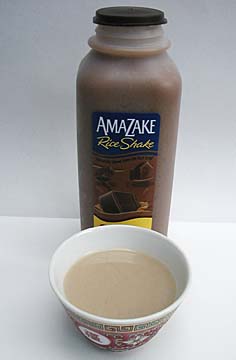|
Key Ingredient
|
AMAZAKE

A sweet sip of rice
Amazake is sometimes referred to as a sweet rice drink made from sake, but this is somewhat of a misnomer. The name literally translates to "sweet sake," but you can't get drunk off of this beverage.The basics: Amazake is a non-alcoholic rice drink made from cooked rice and koji (the fermenting agent used to make sake, shoyu and miso). Unlike sake, amazake is not left to age and develop. It is a fresh drink made without preservatives or added sugar. Its natural sweetness is derived from the koji's breakdown of starch into sugar.
Amazake has a long history in Japan and was a popular dessert beverage at a time when sugar was scarce and expensive. It was once a popular street-vendor treat and remains common in Japanese inns and teahouses. It is traditionally consumed on Girls' and Boys' Day.
Amazake is brownish-gray, with a thick consistency similar to smoothies or fruit nectars. It has a slightly sweet flavor that can be compared to rice milk and is traditionally enjoyed hot and diluted with water. A pinch of grated ginger is a favorite garnish.
In the United States, amazake has become a health-food drink because of its non-dairy quality.
Selecting: Amazake is generally sold in small bottles or plastic containers. Some American companies add flavorings such as chocolate, banana, strawberry, vanilla or almond -- an adaptation that would make the Japanese consumer cringe.
Storing: Amazake must be kept refrigerated and should be consumed as soon as it is opened.
Use: Amazake is traditionally enjoyed hot, but can also be served cold. It may be diluted with water or enjoyed thick, like a smoothie or shake. People who need alternatives to dairy products can use amazake in a number of recipes, such as salad dressings, puddings, pie fillings, quick breads and frozen desserts.
Where to buy: Look for amazake in the refrigerated sections of Asian markets or health food stores such as Down to Earth. You may need to hunt, as most stores carry it only periodically. Prices range from $2 to $3 a bottle depending on size.
![]()
a free-lance food writer. Contact her
online through features@starbulletin.com
E-mail to Features Desk
[News] [Business] [Features] [Sports] [Editorial] [Do It Electric!]
[Classified Ads] [Search] [Subscribe] [Info] [Letter to Editor]
[Feedback]
